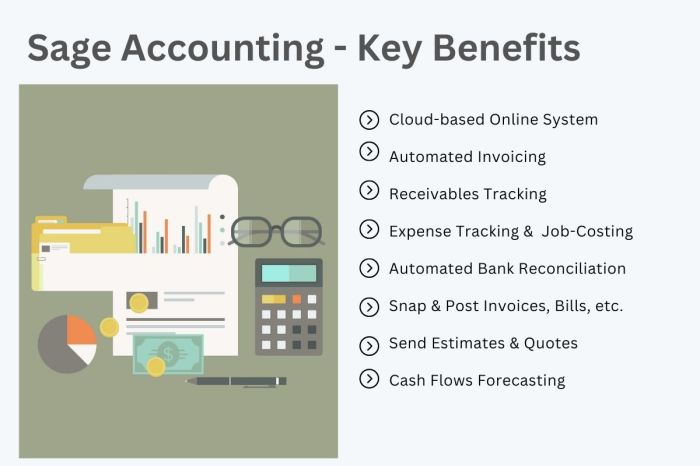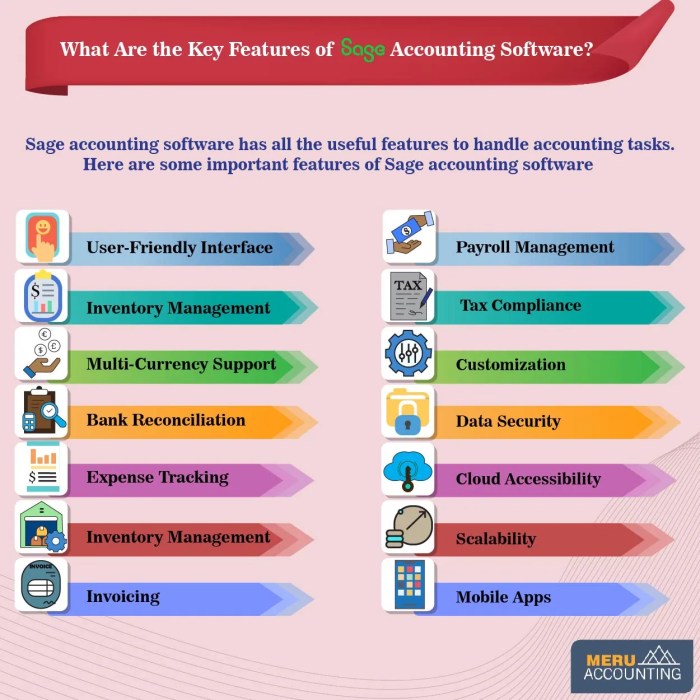What is sage accounting software used for – Sage accounting software is a widely used solution for businesses of all sizes, offering a range of tools to manage their finances effectively. This comprehensive guide delves into the various applications of Sage accounting software, exploring its features and benefits for different user needs. Whether you’re a small business owner, a freelancer, or part of a larger enterprise, understanding Sage’s capabilities is crucial for making informed decisions about your financial management system.
What is Sage Accounting Software Used For?
Sage accounting software provides a centralized platform for managing all aspects of a business’s financial operations. Its core functionality revolves around streamlining accounting processes, but its applications extend far beyond basic bookkeeping. Let’s explore its key uses:
Core Accounting Functions:
- Invoicing and Billing: Create professional invoices quickly and easily, track outstanding payments, and manage customer accounts efficiently. Sage offers customizable invoice templates and automated reminders to improve cash flow.
- Expense Tracking: Record and categorize expenses, generating reports to identify spending patterns and areas for potential savings. Integration with bank accounts and credit cards simplifies expense tracking significantly.
- Financial Reporting: Generate a wide range of financial reports, including profit and loss statements, balance sheets, and cash flow statements. These reports provide valuable insights into the financial health of the business.
- Accounts Receivable (AR) and Accounts Payable (AP): Manage outstanding invoices from customers (AR) and payments to suppliers (AP), ensuring timely payments and minimizing late fees.
- Inventory Management (for applicable versions): Track inventory levels, manage stock, and automate reordering processes to optimize inventory control and prevent stockouts.
- Payroll Management (for applicable versions): Process payroll efficiently, ensuring accurate and timely payment to employees while adhering to tax regulations. This often includes features for calculating deductions and generating payroll reports.
Beyond the Basics: Advanced Features and Applications
Depending on the specific Sage software package chosen (e.g., Sage 50cloud, Sage Business Cloud Accounting, Sage Intacct), businesses can access advanced features that enhance their financial management capabilities. These may include:
- Project Accounting: Track time, expenses, and revenue associated with specific projects, enabling accurate profitability analysis.
- Budgeting and Forecasting: Create budgets, track actual performance against those budgets, and generate forecasts to anticipate future financial needs.
- Customer Relationship Management (CRM) Integration: Integrate with CRM systems to gain a holistic view of customer interactions and financial performance.
- Reporting and Analytics Dashboards: Access real-time financial data through intuitive dashboards, enabling quick identification of key performance indicators (KPIs) and trends.
- Cloud-Based Access: Access financial data anytime, anywhere, from any device with an internet connection, fostering collaboration and flexibility.
- Multi-Currency Support: Manage transactions in multiple currencies, simplifying international business operations.
- Audit Trails: Maintain a detailed record of all transactions and modifications, enhancing transparency and compliance.
Sage Accounting Software for Different Business Types
Sage offers a variety of software solutions tailored to the specific needs of different business types:
Small Businesses:
Sage 50cloud and Sage Business Cloud Accounting are popular choices for small businesses, offering a balance of functionality and affordability. These solutions streamline essential accounting tasks, improving efficiency and accuracy.
Medium-Sized Businesses:
Sage 300 and Sage 100cloud provide more comprehensive features for medium-sized businesses, handling greater transaction volumes and more complex accounting requirements.
Large Enterprises:, What is sage accounting software used for
Sage Intacct is designed for large enterprises, offering robust scalability and advanced features to manage complex financial operations across multiple locations and departments. It often integrates with other enterprise resource planning (ERP) systems.
Choosing the Right Sage Accounting Software
Selecting the appropriate Sage software depends on several factors, including:
- Business Size and Complexity: The size and complexity of your business will dictate the features and functionality you require.
- Number of Users: Consider the number of employees who will need access to the software.
- Industry-Specific Needs: Some Sage solutions offer industry-specific features tailored to particular sectors.
- Budget: Sage offers a range of pricing options to suit different budgets.
- Integration Requirements: Consider the need to integrate with other business software, such as CRM or payroll systems.
Frequently Asked Questions (FAQ)
- Q: Is Sage accounting software easy to use? A: Sage software is generally considered user-friendly, with intuitive interfaces and helpful resources available. However, the ease of use may vary depending on the specific software package and the user’s prior accounting experience.
- Q: How much does Sage accounting software cost? A: Pricing varies significantly depending on the chosen package, features, and number of users. It’s best to contact Sage directly or a certified reseller for a customized quote.
- Q: Does Sage accounting software integrate with other applications? A: Yes, many Sage solutions offer integration with other popular business applications, such as CRM systems, payroll software, and e-commerce platforms. The specific integrations available vary depending on the software package.
- Q: Is Sage accounting software secure? A: Sage employs robust security measures to protect user data. Cloud-based versions typically benefit from enhanced security features offered by the cloud provider.
- Q: What kind of support does Sage offer? A: Sage provides various support options, including online help, phone support, and training resources. The level of support may vary depending on the software package and licensing agreement.
Resources
- Sage Official Website
- AccountingTools (for general accounting information)
Call to Action: What Is Sage Accounting Software Used For
Ready to streamline your financial management? Contact a Sage reseller today for a personalized demonstration and learn how Sage accounting software can benefit your business. Explore the various Sage solutions available and find the perfect fit for your specific needs.
Essential Questionnaire
What types of businesses benefit most from Sage accounting software?
Businesses of all sizes, from small sole proprietorships to large corporations, can benefit from Sage accounting software. The various product lines cater to different needs and scales.
Is Sage accounting software difficult to learn?

Source: centelli.com
The learning curve varies depending on the user’s prior accounting experience and the complexity of the chosen Sage product. However, most versions offer intuitive interfaces and ample training resources to facilitate user adoption.

Source: saifeecomputers.com
How much does Sage accounting software cost?

Source: accountsjunction.com
Pricing for Sage accounting software varies depending on the specific product and features selected. Subscription models and one-time purchases are typically available. It’s best to check the official Sage website for the most up-to-date pricing information.
Can Sage accounting software integrate with other business applications?
Yes, Sage accounting software often integrates with other business applications, such as CRM systems and e-commerce platforms, enhancing overall workflow efficiency. Specific integrations vary depending on the Sage product.
